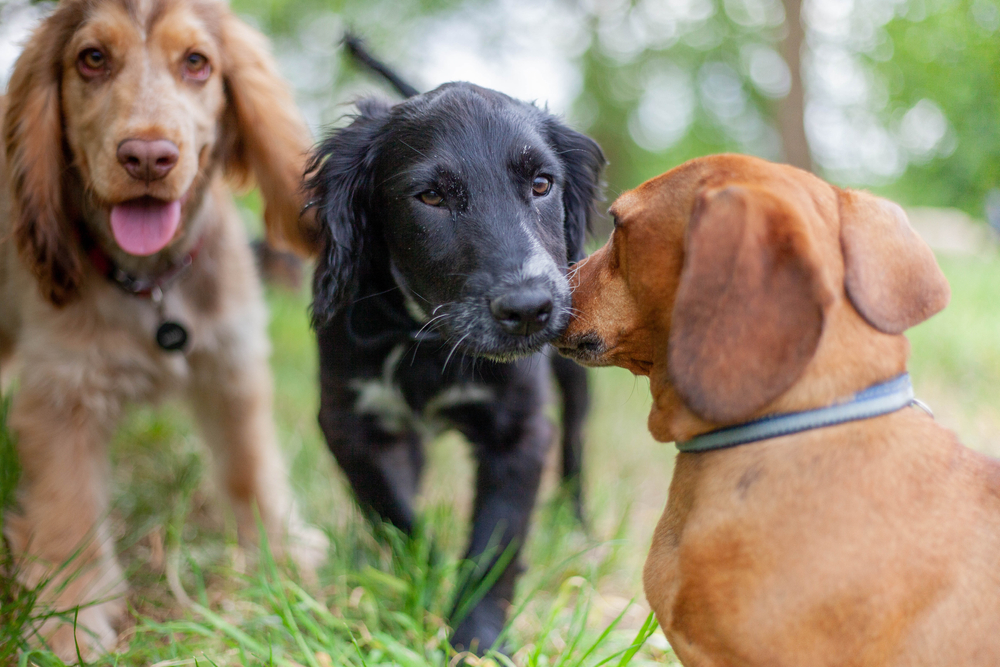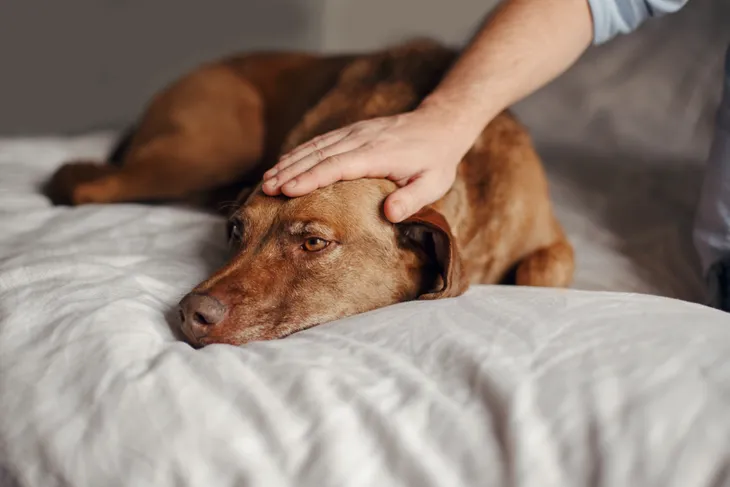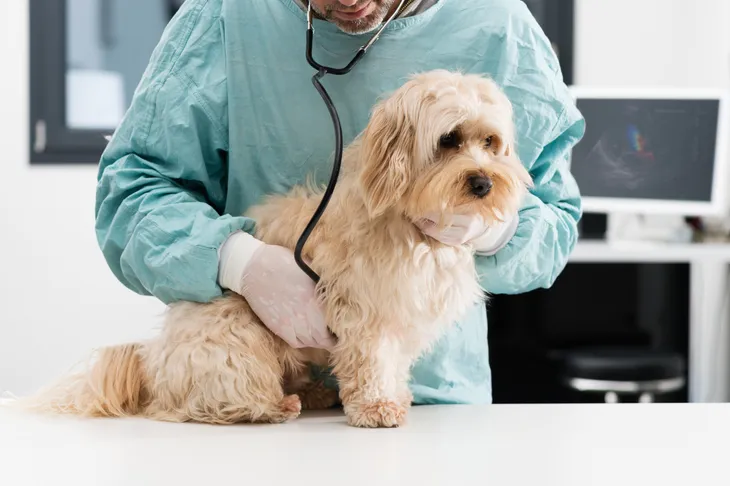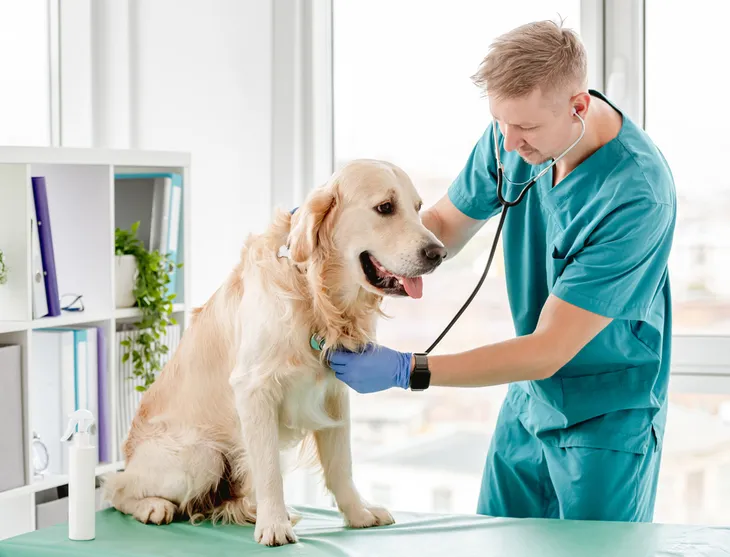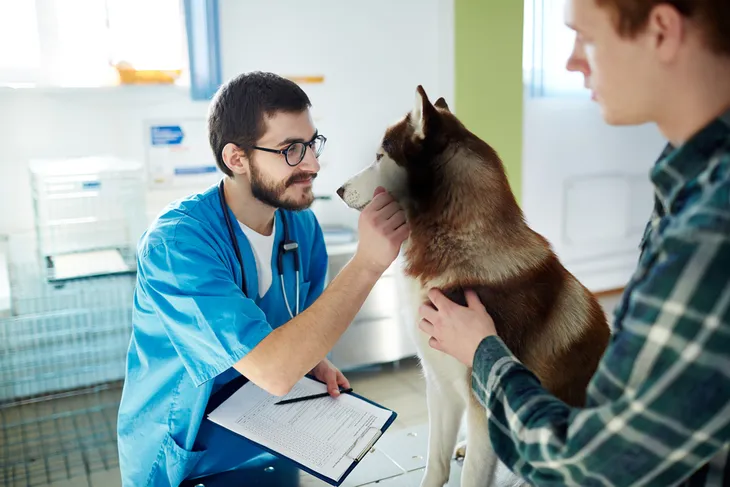- Kennel cough is a respiratory disease.
- The infection causes a persistent dry, hacking cough.
- While it’s not usually serious, it can be life-threatening for puppies or immunocompromised dogs.
It’s never fun when your pup is sick; to make matters worse, they can’t communicate to tell us what’s wrong. So it’s best to brush up on which common illnesses can affect your dog. One of those is kennel cough.
If your dog suddenly develops a persistent dry cough, they may be suffering from kennel cough. While it’s not usually serious, it can be life-threatening for puppies or immunocompromised dogs. Here’s what you need to know about kennel cough in dogs, including the common symptoms, causes, and treatment options. We’ll also look into prevention tips.
What Is Kennel Cough?
Kennel cough, also called canine infectious tracheobronchitis, is a respiratory disease. PetMD explains the infection causes the trachea and bronchioles to become inflamed, which causes a dry cough. Sometimes the coughing can sound like your dog has something stuck in their throat, notes the source.
While the infection usually causes mild symptoms, it can progress into pneumonia which can be life-threatening for some dogs. This is why it’s important to know the signs of kennel cough and get them to the vet when they develop. Early intervention is key!
Common Symptoms of Kennel Cough
The most common sign of kennel cough is a persistent dry, hacking cough. Your dog may also be woken in the night from coughing. The constant coughing may also cause retching. PetMD also notes another symptom of kennel cough is tracheal sensitivity, meaning your dog coughs when you apply gentle pressure to their trachea.
Severe symptoms include lethargy, loss of appetite, fever, and in some cases, labored breathing. If your dog develops one or more of any of these symptoms take them to the vet immediately for a proper diagnosis. If kennel cough is confirmed your vet will provide a treatment plan.
Symptoms Can Mimic Other Health Problems
Another important reason why you should take your dog to the vet as soon as symptoms develop is that symptoms of kennel cough can often mimic other health problems. For starters, the American Kennel Club (AKC) says canine influenza and canine distemper virus both often start with nearly identical symptoms to kennel cough.
Other health problems that cause coughing include asthma, bronchitis, and even a collapsing trachea. It could even be a sign of heart disease, notes the source. All the more reason for a proper diagnosis!
How Long Does Kennel Cough Last?
According to the Burlington Emergency and Veterinary Specialists, the incubation period (the time it takes for the infection to develop in your dog) of kennel cough ranges from 2- to 14-days. Often, the infection is mild and lasts around 1- to 2-weeks.
In some cases, the infection can become severe. If you notice that your dog’s symptoms are worsening, take them to the vet right away.
Causes of Kennel Cough in Dogs
Kennel cough is highly contagious and is passed from dog to dog by inhaling aerosolized bacteria or viruses, explains PetMD. There are a few microorganisms that can cause the infection, such as canine adenovirus, parainfluenza virus, Bordetella bronchiseptica bacteria, mycoplasma, as well as other bacteria and viruses.
The Daily Paws says dogs are most susceptible in crowded environments “because stress and poor air quality inhibit their bodies’ ability to ward off the pathogens in the first place.” Common places for dogs to catch kennel cough include animal shelters, boarding kennels, doggie daycare facilities, grooming facilities, and even dog parks.
Complications
Kennel cough can be mild and many dogs recover without complications. That said, it can lead to life-threatening pneumonia which is very serious. Some dogs are more susceptible to complications such as puppies. This is because they have immature immune systems, and some of them may not be fully vaccinated either.
Senior dogs with decreased immunity can also be at risk for complications, especially seniors with diabetes, cancer, or heart failure. PetMD also notes that pregnant dogs and dogs with pre-existing respiratory disease are also at risk for complications from kennel cough.
Is Kennel Cough Contagious to Humans?
Kennel cough is very contagious but not to humans. However, the Daily Paws notes that humans can spread it from dog to dog. “Like the flu virus, Bordetella and other bacteria can live on surfaces, so it’s important to keep water bowls, toys, surfaces, and even your hands disinfected if you suspect your dog has kennel cough,” explains the source.
Since it is so contagious, it’s important to keep your dog home (except for visiting the vet, of course) until their symptoms improve.
Diagnosing Kennel Cough
If your dog has mild symptoms and is eating and playing normally then you may not need to visit your vet as mild cases may clear up on their own. But it’s still a good idea to call your vet and ask for their advice. However, if your dog’s behavior changes and symptoms are more severe then you should take them to the vet right away for a proper diagnosis.
There isn’t a specific test to diagnose kennel cough, however, your vet will examine your dog’s symptoms and rule out other conditions that may be causing their cough. Your vet can take swabs to determine the exact bacteria or virus causing kennel cough but the Blue Cross says it’s not always necessary or useful for treatment.
Kennel Cough Treatment
According to the AKC, mild cases of kennel cough resolve within 1- to 2-weeks of rest. That said, if your dog has a secondary infection, your vet may prescribe antibiotics. The source also notes that cough medication may be necessary to help ease their symptoms. But ultimately, your vet will recommend the best treatment for your furry companion.
It’s also important to note, when walking your dog be sure to use a harness instead of a collar. The collar can place extra pressure on their trachea which can aggravate the cough and “possibly even cause damage to the trachea,” explains the source.
Treating Severe Cases of Kennel Cough
Puppies, senior dogs, and dogs with existing health conditions are at risk for severe symptoms and complications of kennel cough. The infection can develop into pneumonia. PetMD notes that a dog with severe kennel cough will often be coughing and acting lethargic. They may also be uninterested in eating or drinking.
If your dog develops pneumonia, hospitalization may be necessary. Treatment may involve antibiotics, intravenous fluids, and oxygen therapy.
Home Remedies
For mild cases of kennel cough, there are a few at-home remedies you can try to help ease their symptoms while they recover. For starters, PetMD says you can give your dog 1/2- to 1-tablespoon of honey mixed with warm water in a bowl. Honey can help soothe their throat and may decrease coughing.
Placing a small humidifier by your dog’s bed may help too. The humidifier can moisten the air that they breathe and in turn soothe irritation in their respiratory tract. Finally, the most important remedy for kennel cough is lots of rest. While your dog recovers, reduce their normal amount of exercise and encourage rest. Once they have recovered or are cleared by the vet, you can resume your regular daily activity with your furry companion.
Preventing Kennel Cough
One way you can protect your dog from kennel cough is by getting them vaccinated. The AKC explains that there is “a vaccine available for the bordetella bacterium, which is the most common agent to cause kennel cough.” Vaccination may be especially important for dogs who socialize or go to facilities such as doggie daycare, boarding, grooming, or dog parks. Some facilities even require proof of vaccination.
The source says the vaccine is usually given in two doses, 4-weeks apart. A booster is also necessary every 6-months to 1-year. Keep in mind, kennel cough can be caused by other agents which means the vaccine may not be 100-percent effective. That said, if you’re worried about kennel cough and your dog isn’t vaccinated, talk to your vet about your options.
